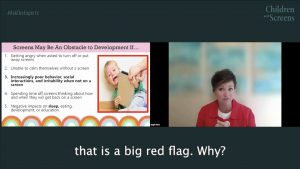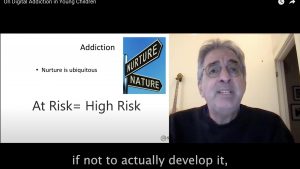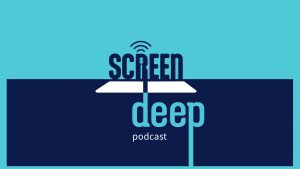
Angie McNeal, MS (Speech Language Pathologist, Policy Advisor for Speech-Language Pathology and Early Literacy, South Carolina Department of Education) discusses behavioral signs that indicate screen use may be interfering with early cognitive development. McNeal explains that these can be indicators of screen dependency in young children at the #AskTheExperts webinar “Finding Words: Language Development and Screen Use” on October 28, 2024.
Read the Video Transcript
[Dr. Angie Neal] What might be some of the signs that screens are becoming an obstacle to building a brain that is ready to learn? Which is good to know, because trying to figure out whether screen use is or isn’t harmful and how much or how little, it can be kind of complicated. So first, if your child is getting very angry and very upset when they’re asked to turn off a screen or put them away, that is a big red flag. Why? Because essentially what this is saying is that your child is overstimulated. And so that is why it’s hard for them to get off of the screen, because they have to go from being way up here with all this stimulation coming right at them all the way back down to the pace of real life. Similarly, when children can’t calm down when they’re without a screen. So if you think about it like a pacifier or when children suck their thumbs, they use those tools to calm and soothe themselves as infants until they learn how to do it without them. And just as we wouldn’t expect to see children walking around with pacifiers for extended period of time as they get older because they’ve learned how to calm down without them, it’s the same thing as it relates to children and screens.
View the full webinar

Finding Words: Language Development and Screen Use
How does digital media exposure affect the development of language and communication skills in young children ages 0-5 years old?
Kathy Hirsh-Pasek, PhD
Lefkowitz Faculty Fellow in Psychology, Temple University; Senior Fellow, Brookings Institution
Rebecca Dore, PhD
Director of Research, Crane Center for Early Childhood Research and Policy, The Ohio State University
Sarah Kucker, PhD
Assistant Professor of Psychology, Southern Methodist University
Angie Neal, MS
Speech Language Pathologist, Policy Advisor for Speech-Language Pathology and Early Literacy, South Carolina Department of Education





